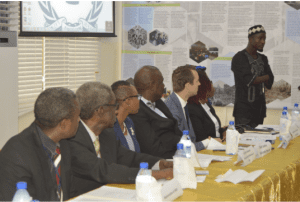 The Residual Special Court today opened the refurbished Sierra Leone Peace Museum, a legacy of the RSCSL and a monument to the country’s decade-long civil war and its return to peace. The Museum is housed at the former Special Court compound on Jomo Kenyatta Road.
The Residual Special Court today opened the refurbished Sierra Leone Peace Museum, a legacy of the RSCSL and a monument to the country’s decade-long civil war and its return to peace. The Museum is housed at the former Special Court compound on Jomo Kenyatta Road.
The Peace Museum honours the victims of the war, preserves the history of the war and explains its causes. It tells the story of the peace process, builds peace, and promotes a culture of human rights. The Museum also houses a paper copy of the Special Court’s public archives and the archives of the Truth and Reconciliation for the use of researchers and scholars from Sierra Leone and abroad.
RSCSL Registrar Binta Mansaray said that while the RSCSL had worked hard to refurbish and re-open the Museum, she called on the Government of Sierra Leone to provide financial and other support to ensure that it will be sustainable.
The refurbished Peace Museum was re-opened officially by Minister of Justice and Attorney-General Priscilla Schwartz.
In delivering her keynote address before an audience of government ministers, diplomats and jurists, war
victims and former combatants, civil society activists, academics,students and members of the public, Ms.
Schwartz promised her Ministry would do whatever it could to urge the government would support the
Museum going forward.
She highlighted the role of the Museum and the Public Archives contained therein “for nationwide peace- education for everyone, especially young Sierra Leoneans who were not born when the war occurred”.
“The commitment is about always defending criminal justice, human rights and the rule of law,” she said.
“It is about continuously strengthening trust in our societies, defending freedom of expression and fighting
for truth and reconciliation. All these are necessary for continued peace, reconciliation and prosperity in
Sierra Leone. They are necessary for a sustainable development in Sierra Leone”.
Chief Justice Desmond Babatunde Edwards, in his remarks, also pledged the support of Sierra Leone’s judiciary for the Museum. A memorial garden is planned for the next phase as a place of reflection to honour the victims of the conflict.
“The Sierra Leone peace museum presents an opportunity to Sierra Leoneans to reflect on human rights, human dignity, criminal justice, transitional justice, peace and reconciliation”, AG Schwartz said. “It will be up to every Sierra Leonean, to ensure that history does not repeat itself in Sierra Leone”.











